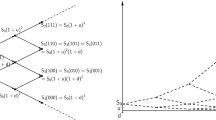Abstract
In this paper a discrete-time Markovian model for a financial market is chosen. The fundamental theorem of asset pricing relates the existence of a martingale measure to the no-arbitrage condition. It is explained how to prove the theorem by stochastic dynamic programming via portfolio optimization. The approach singles out certain martingale measures with additional interesting properties. Furthermore, it is shown how to use dynamic programming to study the smallest initial wealth x * that allows for super-hedging a contingent claim by some dynamic portfolio. There, a joint property of the set of policies in a Markov decision model and the set of martingale measures is exploited. The approach extends to dynamic options which are introduced here and are generalizations of American options.
Access this chapter
Tax calculation will be finalised at checkout
Purchases are for personal use only
Preview
Unable to display preview. Download preview PDF.
Similar content being viewed by others
References
D. Bertsekas, “Necessary and sufficient conditions for existence of an optimal portfolio”, J. Econ. Theory 8, 235–247, 1974.
H. Bühlmann, F. Delbaen, P. Embrechts and A. Shiryaev, “On Esscher transforms in discrete finance models”, Astin Bulletin 28, 171–186, 1998.
R.C. Dalang, A. Morton and W. Willinger, “Equivalent martingale measures and no-arbitrage in stochastic securities market models”, Stochastics and Stochastic Reports 29, 185–201, 1990.
M.H.A. Davis, “Option pricing in incomplete markets”, in: Mathematics of Derivative Securities, ed: M.A.H. Dempster, S.R. Pliska, Cambridge Univ. Press, 216–226, 1997.
F. Delbaen, and M. Yor, “Passport options”, Working paper, ETH Zürich, 1999.
E.B. Dynkin and A.A. Yushkevich, Controlled Markov Processes, Springer, Berlin, 1997.
N. El Karoui and M.C. Quenez, “Dynamic programming and pricing of contingent claims in an incomplete market”, SIAM J. Control Optim. 33, 29–66, 1995.
A.G. Fakeev, “Optimal stop** rules for processes with continuous parameter”, Theory Probab. Appl. 15, 324–331, 1970.
E.A. Feinberg, “Total reward criteria”, This volume, 2000.
H. Föllmer and Yu.M. Kabanov, “Optional decomposition and Lagrange multipliers”, Finance Stochast. 2, 69–81, 1998.
H. Föllmer and D. Kramkov, “Optional decompositions under constraints”, Probab. Theory Relat. Fields 109, 1–25, 1997.
H. Föllmer and M. Schweizer, “Hedging of contingent claims under incomplete information”, in: Applied Stochastic Analysis, eds. M.H.A. Davis and R.J. Elliot, Gordon and Breach, London, 1990.
M. Fritelli, “The minimal entropy martingale measure and the valuation problem in incomplete markets”, Mathematical Finance. To appear.
P. Grandits, “The p-optimal martingale measure and its asymptotic relation with the minimal-entropy martingale measure”, Bernoulli 5, 225–248, 1999
P. Grandits and Th. Rheinlaender “On the minimal entropy martingale measure”, Preprint, Techn. Univ. Berlin, Fb. Mathem. 1999.
N. H. Hakansson, “Optimal entrepreneurial decisions in a completely stochastic environment”, Management Science 17, 427–449, 1971.
J.M. Harrison and D.M. Kreps, “Martingales and arbitrage in multiperiod securities markets”, J. Economic Theory 20, 381–408, 1979.
J.M. Harrison and S.R. Pliska, “Martingales and stochastic integrals in the theory of continuous trading”, Stoch. Processes & Appl. 11, 215–260, 1981.
K. Hinderer, Foundations of non-stationary dynamic programming with discrete time-parameter, Lecture Notes in Operations Research and Mathematical Systems 33 Berlin-Heidelberg-New York: Springer, 1970.
A. Hordijk, Dynamic Programming and Markov Potential Theory, Amsterdam: Mathematical Centre Tracts 51, 1974.
J. Jacod and A.N. Shiryaev, “Local martingales and the fundamental asset pricing theorems in the discrete-time case”, Finance Stochast. 3, 259–273, 1998.
I. Karatzas, “On the pricing of American Options”, Appl.Math. Optim. 17, 37–60, 1988.
I. Karatzas and S.G. Kou, “On the pricing of contingent claims under constraints”, Ann. Appl. Probab. 6, 321–369, 1996.
R. Korn and M. Schäl, “On value preserving and growth optimal portfolios”, Math. Methods Op. Res. 50, 189–218, 1999.
D.O. Kramkov, “Optional decomposition of supermartingales and hedging of contingent claims in incomplete security markets”, Probab. Theory Relat. Fields 105, 459–479, 1996.
H.-U. Küenle, Stochastische Spiele und Entscheidungsmodelle, Teubner-Texte zur Mathematik, 89. Teubner, Leibzig, 1986.
H. Leland, “On the existence of optimal policies under uncertainty”, J. Econ. Theory 4, 35–44, 1972.
R.C. Merton, Continuous-time Finance, Blackwell, Cambridge, MA, 1990.
M. Motoczynski, “Multidimensional variance-optimal hedging in discrete time model—a general approach”, Mathematical Finance 10, 243–258, 2000.
M. Motoczynski and L. Stettner, “On option pricing in the multidimensional Cox-Ross- Rubinstein model”, Applicationes Mathematicae 25, 55–72, 1998.
V. Naik and R. Uppal, “Minimum cost hedging in incomplete Markets”, Univ. of British Columbia, Working paper, 1992.
S.R. Pliska, Introduction to Mathematical Finance, Blackwell publisher, Maiden, USA, Oxford, UK, 1997.
L.C.G. Rogers, “Equivalent martingale measures and no-arbitrage”, Stochastics and Stochastic Reports 51, 41–49, 1994.
R.T. Rockafeller, Convex Analysis, Princeton Univ. Press, Princeton, N.J, 1970.
W. J. Runggaldier and A. Zaccaria, “A stochastic control approach to risk management under restricted information”, Mathematical Finance 10, 277–288, 2000.
W. Schachermayer, “A Hilbert space proof of the fundamental theorem of asset pricing in finite discrete time”, Insurance: Mathematics and Economics 11, 249–257, 1992.
M. Schäl, “On quadratic cost criteria for option hedging”, Math. Oper. Res. 19, 121–131, 1994.
M. Schäl, “Martingale measures and hedging for discrete-time financial markets”, Math. Oper. Res. 24, 509–528, 1999.
M. Schäl, “Portfolio optimization and martingale measures”, Mathematical Finance 10, 289–304, 2000.
M. Schäl, “Price systems constructed by optimal dynamic portfolios”, To be published in Math. Methods Op. Res, 2000.
M. Schweizer, “Variance-optimal hedging in discrete time”, Math. Oper. Res. 20, 1–32, 1995.
M. Schweizer, “Approximation pricing and the variance-optimal martingale measure”, Ann. Prob. 24, 206–236, 1996.
S. E. Shreve and J. Večeř “Options on a traded account: vacation calls, vacation puts and passport options”, Finance Stochast. 4, 255–274, 2000.
Author information
Authors and Affiliations
Editor information
Editors and Affiliations
Rights and permissions
Copyright information
© 2002 Springer Science+Business Media New York
About this chapter
Cite this chapter
Schäl, M. (2002). Markov Decision Processes in Finance and Dynamic Options. In: Feinberg, E.A., Shwartz, A. (eds) Handbook of Markov Decision Processes. International Series in Operations Research & Management Science, vol 40. Springer, Boston, MA. https://doi.org/10.1007/978-1-4615-0805-2_15
Download citation
DOI: https://doi.org/10.1007/978-1-4615-0805-2_15
Publisher Name: Springer, Boston, MA
Print ISBN: 978-1-4613-5248-8
Online ISBN: 978-1-4615-0805-2
eBook Packages: Springer Book Archive




